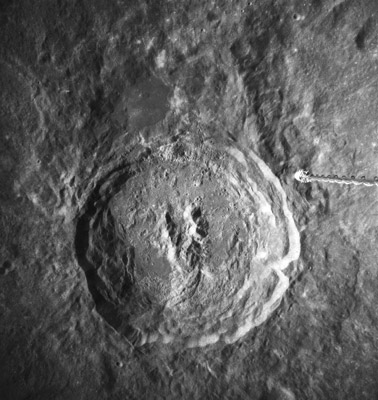Difference between revisions of "January 19, 2004"
| Line 14: | Line 14: | ||
</tr> | </tr> | ||
</table> | </table> | ||
| − | |||
<table class="story" border="0" bgcolor="#FFFFFF" width="90%" cellpadding="10" align="center"><tr><td> | <table class="story" border="0" bgcolor="#FFFFFF" width="90%" cellpadding="10" align="center"><tr><td> | ||
<p class="story" align="center"><b>King of the Craters</b></p> | <p class="story" align="center"><b>King of the Craters</b></p> | ||
| Line 27: | Line 26: | ||
above King may have been sloshed out of King by collapse of part of the crater's opposite inner rim, which made the | above King may have been sloshed out of King by collapse of part of the crater's opposite inner rim, which made the | ||
"body" of the lobster. | "body" of the lobster. | ||
| − | <p class"story"><b>Related Links:</b><br> | + | <p class="story"><b>Related Links:</b><br> |
[http://www.hq.nasa.gov/office/pao/History/SP-362/cover.htm King in Apollo Over the Moon], pages 149-160<br> | [http://www.hq.nasa.gov/office/pao/History/SP-362/cover.htm King in Apollo Over the Moon], pages 149-160<br> | ||
[http://www.lpi.usra.edu/publications/slidesets/3dsolarsystem/slide_16.html King Crater in Stereo] (red-green glasses required)<br> | [http://www.lpi.usra.edu/publications/slidesets/3dsolarsystem/slide_16.html King Crater in Stereo] (red-green glasses required)<br> | ||
[http://www.time.com/time/time100/leaders/profile/king.html Martin Luther King, Jr]</p> | [http://www.time.com/time/time100/leaders/profile/king.html Martin Luther King, Jr]</p> | ||
| − | <p class"story"> <b>Tomorrow's LPOD:</b> French Moon</p | + | <p class="story"> <b>Tomorrow's LPOD:</b> French Moon</p> |
| − | |||
</table> | </table> | ||
| − | |||
| − | |||
| − | |||
| − | |||
<!-- start bottom --> | <!-- start bottom --> | ||
<table width="100%" border="0" cellspacing="2" cellpadding="4"> | <table width="100%" border="0" cellspacing="2" cellpadding="4"> | ||
| Line 55: | Line 49: | ||
</table> | </table> | ||
<!-- end cal --> | <!-- end cal --> | ||
| − | <div align="center"></div | + | <div align="center"></div> |
| − | |||
<p> </p> | <p> </p> | ||
---- | ---- | ||
===COMMENTS?=== | ===COMMENTS?=== | ||
Click on this icon [[image:PostIcon.jpg]] at the upper right to post a comment. | Click on this icon [[image:PostIcon.jpg]] at the upper right to post a comment. | ||
Revision as of 18:14, 4 January 2015
King of the Craters
Image Credit: NASA Apollo 16 metric Camera AS16-1580 |
|
King of the Craters In the USA, January 19 is Martin Luther King Day, a time to commemorate the life of a leading civil rights leader. What better way to celebrate than to appreciate King crater on the farside of the Moon. The crater was named not for MLK, but for two relatively forgotten American scientists, Arthur King and Edward King. King is probably the most intensively studied crater on the farside because of its unusual central peak and smooth deposits. In general, 76 km wide King is a Copernicus-like complex impact crater, with terraced walls, flat floor and central peak complex. According to analysis of Clementine multi-spectral data, the lobster-like peak is a mixture of different rock types, including highland anorthosites and mare-like gabbros. The flat, darkish materials on the floor of King, along some of its terraces and especially filling the crater above King are thought to be rocks liquified by the energy of impact. The extensive pond above King may have been sloshed out of King by collapse of part of the crater's opposite inner rim, which made the "body" of the lobster. Related Links: Tomorrow's LPOD: French Moon |
Author & Editor: Technical Consultant: A service of: |
COMMENTS?
Click on this icon File:PostIcon.jpg at the upper right to post a comment.




